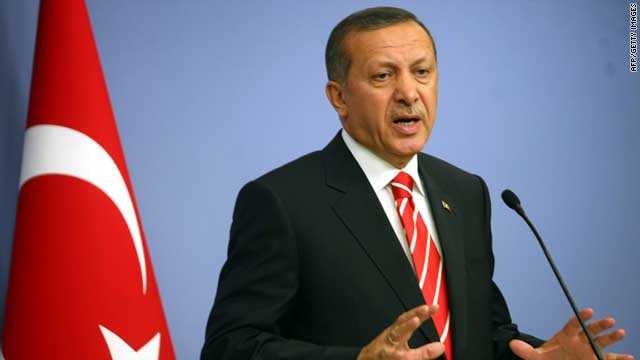When former U.S. Secretary of State Madeleine Albright referred to the U.S. as the “indispensable nation” in 1998, she was justifying America’s unique role as global Leviathan. She explained this unfortunate hegemonic burden by adding, “If we have to use force, it is because we are America.” Although the Turks have taken on this mantle in recent years, Turkey’s indispensability derives from factors other than the size of its military.
 Diplomatic prowess and mastery of Realpolitik have undoubtedly served Turkey well, but the source of Turkey’s global influence has been, quite simply – the power of its example.
Diplomatic prowess and mastery of Realpolitik have undoubtedly served Turkey well, but the source of Turkey’s global influence has been, quite simply – the power of its example.
Ironically, the U.S. – once upon a time – led in similar fashion. In 1630 John Winthrop believed the Massachusetts Bay Colony would serve as a “city upon a hill” to be watched by the world.
This attitude, according to Andrew Bacevich, became the basis of a distinctly American approach to leadership from the time of the Founders and one “informed by a conviction that self-mastery should take precedence over mastering others”.
Turkey’s pluralistic democracy has emerged as a governing model exemplar, especially for Muslim countries seeking to balance secular law with religious principle.
It has played a crucial economic and geopolitical role over the past decade in the affairs of a number of countries across the globe.
In the face of global recession, Turkey’s vibrant economy has grown from $250 billion in 2002 to an annual GDP of around $800 billion, making it Europe’s sixth largest economy and the 17th largest in the world. Not to mention it happens to be the EU’s largest trading partner.
David Garner in the Financial Times described Turkish premier Recep Tayyip Erdogan as the non-Arab leader Arabs have most admired since Saladin recaptured Jerusalem from the Crusaders in 1187.
Turkey’s unrivaled level of popularity is evidenced by Zogby’s 2011 survey of Arab attitudes, in which Turkey received stellar approval ratings from a broad spectrum of countries, from Sunni nations like Saudi Arabia (98%) to Shia strongholds like Lebanon (93%).
Within Egypt, the world’s largest Arab country, 62% of residents agree with Erdogan’s policies. Compare this to President Obama’s approval rating which has sunk to an all-time low of 3%.
There is no doubt Turkey has good timing with respect to its rising importance in balancing the Greater Middle East. Steven Cook from the Council on Foreign Relations recently pointed out that on top of Washington being broke, Europe is burdened with debt and has been unable to shape events in the region since Paris and London abandoned their colonies and protectorates in the 1960s and early 1970s.
Cook also indicated that Turkey, with its rapid economic growth and entrepreneurial spirit, could provide Egyptians, Tunisians, and Libyans with what they need most – investment of the type that lacks the “conditionality” of Saudi, Qatari, and Emirati aid.
Geopolitically-speaking, the Saudis rely on Turkey as a Sunni bulwark against Iran in Iraq. In Syria, experts believe Bashar al-Assad will not survive without Turkey’s support.
Syrians from around the world gathered in Istanbul last week to establish the official opposition movement – yet another sign of Turkey’s appeal as chief arbiter of regional dilemmas.
Turkey has even acted as a key interlocutor in Afghanistan’s reconciliation process by hosting a number of negotiations between the Taliban and representatives from the Karzai regime, the U.S. and Saudi Arabia at different points in time.
Turkey has also embarked on a diplomatic strategy that includes humanitarian aid as a key flank and has been able to raise impressive levels of assistance for a still emerging market. Political, economic, and civil initiatives in Africa today, for example, were beyond the imagination a decade ago.
As Somalia suffers through the famine of the century and the international system fails to come up with a viable solution, Ergodan has been the only world leader to visit the country during the crisis. Turkey has donated over $250 million to Somalia and Turkish ambulances just started operating in Mogadishu this past weekend.
Turkey’s Muslim bona fides have been buttressed by its escalating hostility towards Israel and support for the Palestinian cause. The situation has put the Obama administration in a tough position, because Turkey is also indispensable to the U.S. and its allies.
A member of NATO and an EU candidate, Turkey is valued as a bridge between the Western world and the Middle East and is esteemed by U.S. leaders as a key ally in the war on terror and a counterbalance to Iranian influence.
Turkey has even agreed to station a radar on its territory as part of a missile defense system to protect NATO countries from long-range Iranian missiles.
Prudence dictates the U.S. to embrace Turkey’s ascendance on the international stage and to continue solidifying its relationship with Ankara as Washington’s global standing wanes.
Otherwise, long term, the U.S. could be left looking from the outside in – and might find itself on the wrong side of history, just as it has amidst the Arab Spring.
via Turkey: The Indispensable nation – National Geopolitics | Examiner.com.